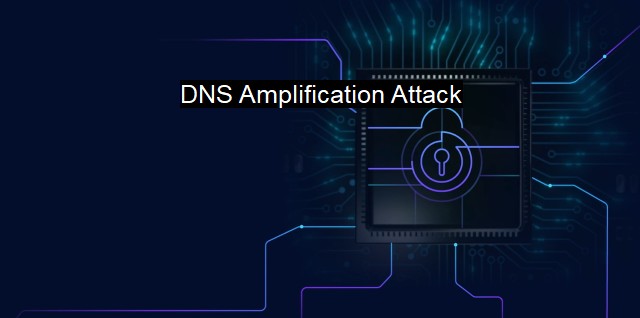What is DNS Amplification Attack?
DNS Amplification Attacks: Exploiting Vulnerabilities for Widespread Cyber Attacks
DNS Amplification Attack is a distributed denial-of-service (DDoS) technique used by hackers to disrupt, damage, or shut down targeted systems or networks. The term "amplification" refers to the engagement of a small amount of data to generate a hefty amount of traffic at the target system or server. The magnitude of malicious traffic caused by an amplification attack can be extremely high, escalating the level of damage to the targeted system.To understand a DNS Amplification Attack, one needs to understand the basics of the DNS (Domain Name System) and DDoS attack. DNS is a fundamental internet system that translates human-friendly domain names such as www.website.com into numerical IP addresses allocated by servers. Meanwhile, DDoS is a malicious hack attack aiming to overload the website's server with an enormous amount of unwanted, bogus traffic with intentions to impede the smooth functioning of the site or even force a temporary or permanent shutdown.
In the context of a DNS Amplification Attack, the hacker manipulates the DNS mechanism by submitting a query with the targeted server's spoofed IP address. The DNS server, interpreting this query as a genuine request from the targeted server, sends a massive amount of response traffic to the spoofed IP address-this being the targeted system. Consequently, an operational havoc causing annihilation of the server’s network resources and a potential system shutdown.
It's difficult to prevent this type of attack because the servers generally openly respond to all queries. the protocol's architecture itself is used maliciously along with the server's lack of source IP address verification, thus exploiting its vulnerability and initiating the attack.
To mitigate the likelihood of a DNS amplification attack, cybersecurity defenses typically involve measures such as rate limiting, use of Unicast Reverse Path Forwarding (uRPF), and deploying sophisticated technological defenses like an Intrusion Detection System (IDS) or an Intrusion Prevention System (IPS). Rate limiting helps control and limit the communication by requests per second, restricting the number of responses the server sends out and ultimately managing the pressure upon the network resources. On the other hand, uRPF is like a filter verifying the authenticity of the source IP address before sending outward responses. Although not 100% foolproof, it can definitely thwart the chances of a successful attack.
Antivirus systems can simultaneously add another layer of safeguard in an organization, protecting from potential malware that could be used to conduct such kinds of attacks. Regular system updates, periodical IT auditing, deployment of state-of-the-art firewalls and other cyber defense tools, network ‘Hygiene’, usage of secure VPNs for remote connections, traffic pattern monitoring, staying vigilant and on top of the latest cybersecurity threats, etc., will also significantly discourage and deter any possible DNS amplification attacks-push the hackers to focus on easier targets perhaps!
Cybersecurity is an ever-evolving marvel compelled of its dubbed neck-to-neck, never concluding, cat & mouse competition with cyber-crimes evolving too. Hence, DNS Amplification Attack solving will be, for sure, another pedestal in the way of undefeated cybersecurity's unending journey. Cybersecurity's unrelenting research embodying technologically advanced defense mechanisms and strategic antivirus systems envisions encapsulating and terminating every breach attempt beforehand, safeguarding smooth, secure, daunting-free, and seamless network flow across globally spread servers and networks.

DNS Amplification Attack FAQs
What is a DNS amplification attack?
A DNS amplification attack is a type of DDoS attack in which an attacker takes advantage of vulnerabilities in the DNS system to flood a target network or server with a large amount of traffic. The attack works by sending a DNS query to an open DNS resolver, spoofing the source IP address to that of the targeted server. The DNS resolver then sends a large response to the spoofed IP address, overwhelming the server with traffic.How can I protect my network from DNS amplification attacks?
To protect your network from DNS amplification attacks, you can implement various security measures such as using firewalls, network segmentation, and disabling open DNS resolvers. You should also keep your DNS servers updated with the latest security patches and configurations. Additionally, using a DNS filtering service can help detect and block malicious traffic before it reaches your network.How do I know if my network is under a DNS amplification attack?
If your network is under a DNS amplification attack, you may notice a sudden spike in traffic, unusual DNS query patterns, and slow network performance. You can use network monitoring tools to detect unusual traffic patterns and analyze DNS queries to identify potential attacks.What are the consequences of a DNS amplification attack?
The consequences of a DNS amplification attack can be severe, as it can cause downtime, slow network performance, and loss of data. It can also impact your organization's reputation and result in financial losses. To minimize the damage caused by a DNS amplification attack, it's important to have a solid incident response plan in place and regularly backup your data.| | A | | | B | | | C | | | D | | | E | | | F | | | G | | | H | | | I | | | J | | | K | | | L | | | M | |
| | N | | | O | | | P | | | Q | | | R | | | S | | | T | | | U | | | V | | | W | | | X | | | Y | | | Z | |
| | 1 | | | 2 | | | 3 | | | 4 | | | 7 | | | 8 | | |||||||